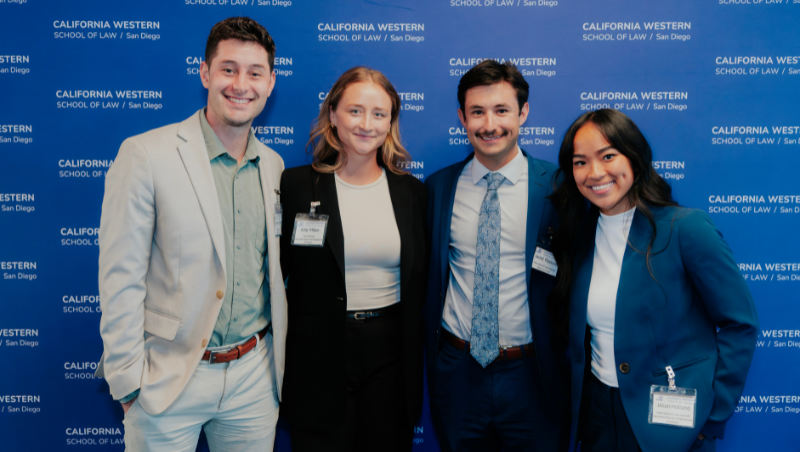
California Western Law Review and International Law Journal Co-Host Annual Spring Symposium

SAN DIEGO (April 10, 2025) -- On March 28, 2025, California Western School of Law's
(CWSL) Law Review and International Law Journal co-hosted their annual Spring Symposium:
“How Labor and Employment Laws Work in Today's Global Economy." Organized under the
leadership of Executive Directors of Symposia & Outreach, Allison Miller and Jillian
Holland Browne, the event convened legal scholars, practitioners, and students to
explore the evolving landscape of labor and employment laws with a dual focus between
domestic and international perspectives.
The symposium highlighted the complex interplay between national policies and international
labor standards, addressing challenges that impact workers, businesses, and policymakers
across borders.
The session brought together two expert voices examining labor from distinct but intersecting
lenses: entertainment law and immigration law. We heard from Senior Deputy Counsel
for SAG-AFTRA Sarah Fowler on Labor in Pop Culture, and Professor of Law Kit Johnson
on the LLC Solution for the Unauthorized Noncitizen Workforce. Sarah Fowler highlighted
the role of Hollywood in shaping public perception about labor unions and the working
class, noting both progress and pitfalls in media portrayals. Professor Johnson explored
how forming limited liability companies (LLCs) allows these individuals to become
self-employed and participate in the economy within legal gray areas. Her proposal
reframes unauthorized immigrants not as lawbreakers, but as entrepreneurs navigating
structural constraints.
The event also featured a series of panel discussions, each focusing on critical aspects
of labor and employment law in a global economy:
- Artificial Intelligence Shaping Protocols
Exploring the integration of artificial intelligence and emerging technologies, panelists discussed their effects on employment practices, ethical considerations, and the necessity for updated regulatory frameworks to address issues such as worker surveillance and data privacy. - Social Movements & Workplace Inclusion
This panel examined the influence of social movements such as #MeToo and Black Lives Matter on workplace policies and diversity, equity, and inclusion (DEI) initiatives. Panelists discussed the current status of DEI initiatives and policies and strategies to foster inclusive work environments across different cultural contexts. - Modern-Day Labor Activism
Focusing on the resurgence of labor activism, this discussion analyzed recent trends in strikes and lockouts, as well as the evolving dynamics of collective bargaining. Experts provided comparative perspectives on how various jurisdictions handle labor disputes and the implications for multinational corporations. - Changes and Challenges from a Pre- and Post-Pandemic World
This panel addressed the transformative impact of the COVID-19 pandemic on the workplace, including the rise of remote work, expansion of the gig economy, and legal challenges related to worker classification. Speakers highlighted the need for legal systems to adapt to these shifts to protect workers' rights effectively.
In conjunction with the symposium, the California Western Law Review and International
Law Journal invited scholars to contribute articles on the discussed topics for publication
in an upcoming volume. This initiative aims to extend the symposium discussion dialogue
and provide a platform for ongoing scholarly engagement.
The symposium underscored CWSL’s commitment to facilitating critical discussions on
pressing legal issues and fostering a collaborative environment for legal scholarship
and practice. Thank you to the Symposium Committee for all of the hard work planning this event.
The symposium would not have been possible without the generous contributions from
The Castetter Fund and O'Hagan Meyer.
About California Western School of Law
For 100 years, California Western School of Law (CWSL) has trained practice-ready
lawyers and thoughtful advocates for justice. As the first and longest-running law
school in San Diego, CWSL remains committed to providing students with the fundamental
knowledge, skills, and real-world experience to thrive in a rapidly evolving legal
landscape. CWSL enrolls a student body representative of our diverse society, amplifying
access to opportunities for social and economic mobility. Tailored programming allows
students to focus on specific areas of interest, and distinguished faculty are dedicated
to student growth and scholarship on critical social issues. The law school emphasizes
practical, hands-on training through clinics, internships, externships, and pro bono
service. CWSL is committed to excellence in education, nurturing compassionate legal
professionals who use the law effectively and creatively to solve complex human and
societal problems. For more information, visit www.CWSL.edu.
